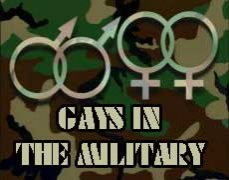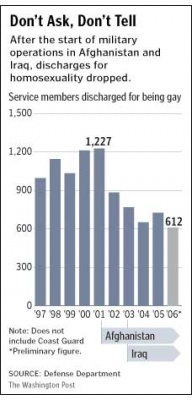 Sharp Drop in Gays Discharged From Military Tied to War Need
Sharp Drop in Gays Discharged From Military Tied to War Need
by Ann Scott Tyson
The number of homosexuals discharged from the U.S. military under the "don't ask, don't tell" policy dropped significantly in 2006, according to Pentagon figures released yesterday — continuing a sharp decline since the Afghanistan and Iraq conflicts began and leading critics to charge that the military is retaining gay men and lesbians because it needs them in a time of war.
According to preliminary Pentagon data, 612 homosexuals were discharged in fiscal 2006, fewer than half the 1,227 discharged in 2001. On average, more than 1,000 service members were discharged each year from 1997 to 2001 — but in the past five years the average has fallen below 730. The data were provided to The Washington Post in response to a request.
"It is hypocritical that the Pentagon seems to retain gay and lesbian service members when they need them most, and fires them when it believes they are expendable," said Steve E. Ralls, a spokesman for the Servicemembers Legal Defense Network, a nonprofit that opposes the policy…
Marine Gen. Peter Pace, chairman of the Joint Chiefs of Staff, sparked an outcry among gay-advocacy groups on Monday when he said he considers homosexual acts "immoral" and therefore opposes lifting the "don't ask, don't tell" rule and allowing homosexuals to serve openly. "We should not condone immoral acts," Pace told the Chicago Tribune in an interview.
Yesterday, Pace said it would have been better to refrain from offering opinions. "I should have focused more on my support of the policy and less on my personal moral views," he said in a statement, noting that the policy itself "does not make a judgment about the morality of individual acts."
President Bush "thought it was appropriate" for Pace to qualify his remarks, presidential counselor Dan Bartlett said yesterday. Defense Secretary Robert M. Gates also suggested yesterday that Pace's "immoral" remark was inappropriate. "Personal opinion really doesn't have a place here. What's important is that we have a law, a statute that governs 'don't ask, don't tell,' " Gates said when asked about his own views on the policy during an interview with the Pentagon Channel.
Pace drew fire yesterday from congressional Democrats, who have recently renewed a push to repeal the policy, as well as from some Republicans and gay-advocacy groups.
"General Pace's statements aren't in line with either the majority of the public or the military," said Rep. Martin T. Meehan (D-Mass.), who last month reintroduced legislation that would repeal the policy on grounds that it is unfair, expensive and harmful to military readiness. "We are turning away good troops to enforce a costly policy of discrimination," he said in a statement. Meehan's legislation has more than 100 co-sponsors and is supported by several prominent retired generals, including a former chairman of the Joint Chiefs of Staff, retired Army Gen. John M. Shalikashvili. Sen. John Warner (R-Va.) said in a statement yesterday: "I respectfully, but strongly, disagree with the Chairman's view that homosexuality is immoral."
More than 10,870 military personnel have been discharged under the policy since President Bill Clinton signed it into law in 1993. The law requires that gay service members keep their sexual orientation private and do not engage in homosexual acts, and it prohibits commanders from asking about sexual orientation.
The dismissed have included Arabic speakers and other linguists, intelligence experts and medical personnel — all of whom are in short supply. In 2005, for example, 49 medical workers were discharged.
"The military can't afford to lose these people, dozens and dozens of well-trained men and women who would ordinarily be doing their job," Ralls said. He said the reduction in discharges since 2001 indicates that the military is applying its policy selectively now because the conflicts in Iraq and Afghanistan have lowered support for joining the military among youths and their parents.
There are an estimated 65,000 gay men and lesbians serving in the military today, according to census-based research by the Williams Institute at the University of California at Los Angeles, Ralls said.

Go to original article
"Go to Original" links are provided as a convenience to our readers and allow for verification of authenticity. However, as originating pages are often updated by their originating host sites, the versions posted on VT may not match the versions our readers view when clicking the "Go to Original" links.
(In accordance with Title 17 U.S.C. Section 107, this material is distributed without profit to those who have expressed a prior interest in receiving the included information for research and educational purposes. VT has no affiliation whatsoever with the originator of this article nor is VT endorsed or sponsored by the originator.)
ATTENTION READERS
We See The World From All Sides and Want YOU To Be Fully InformedIn fact, intentional disinformation is a disgraceful scourge in media today. So to assuage any possible errant incorrect information posted herein, we strongly encourage you to seek corroboration from other non-VT sources before forming an educated opinion.
About VT - Policies & Disclosures - Comment Policy



